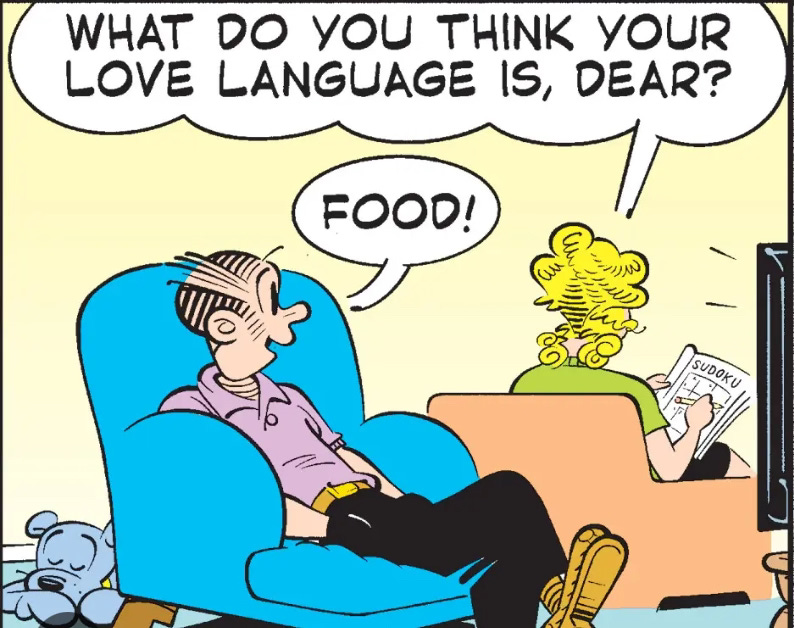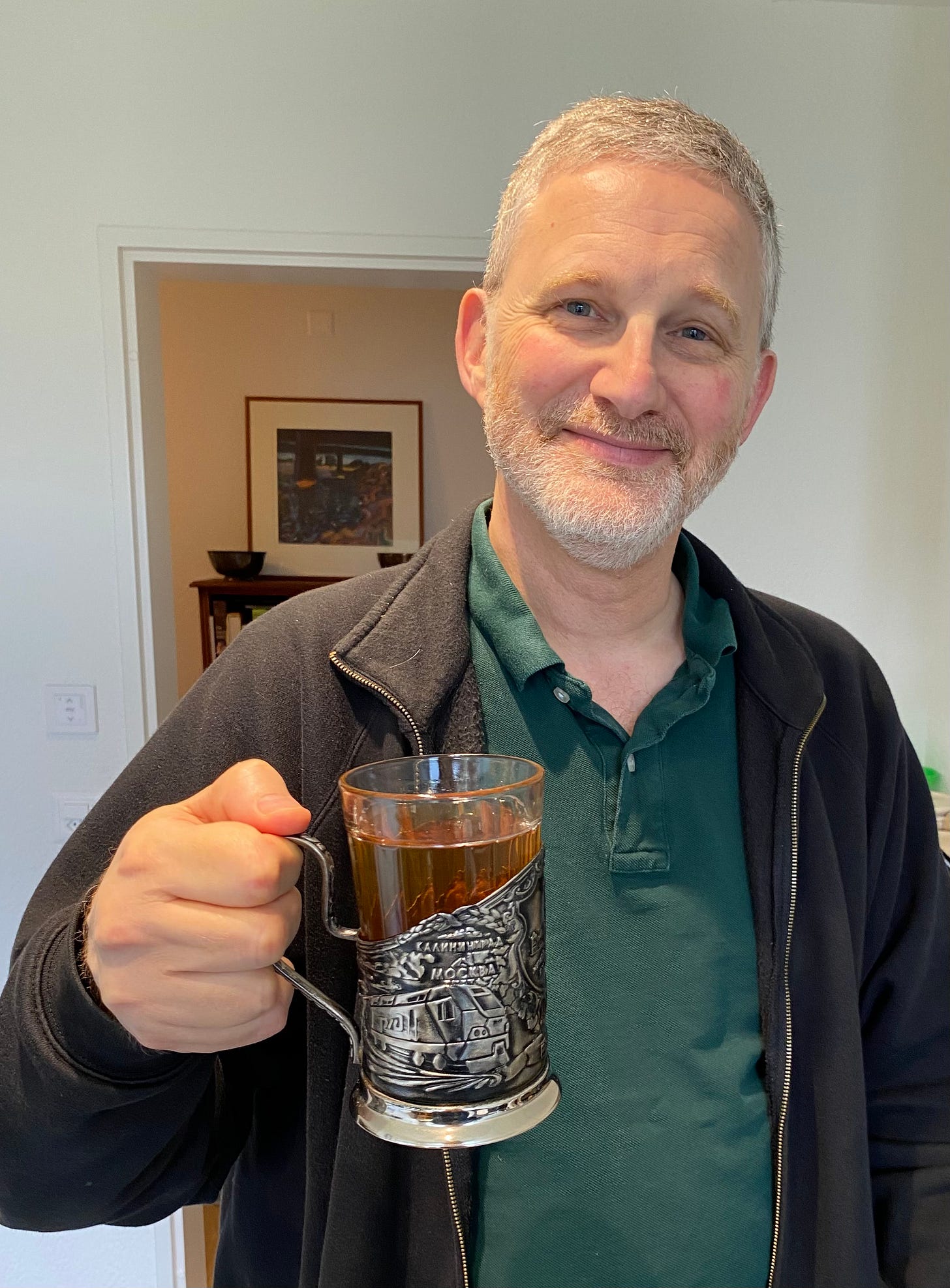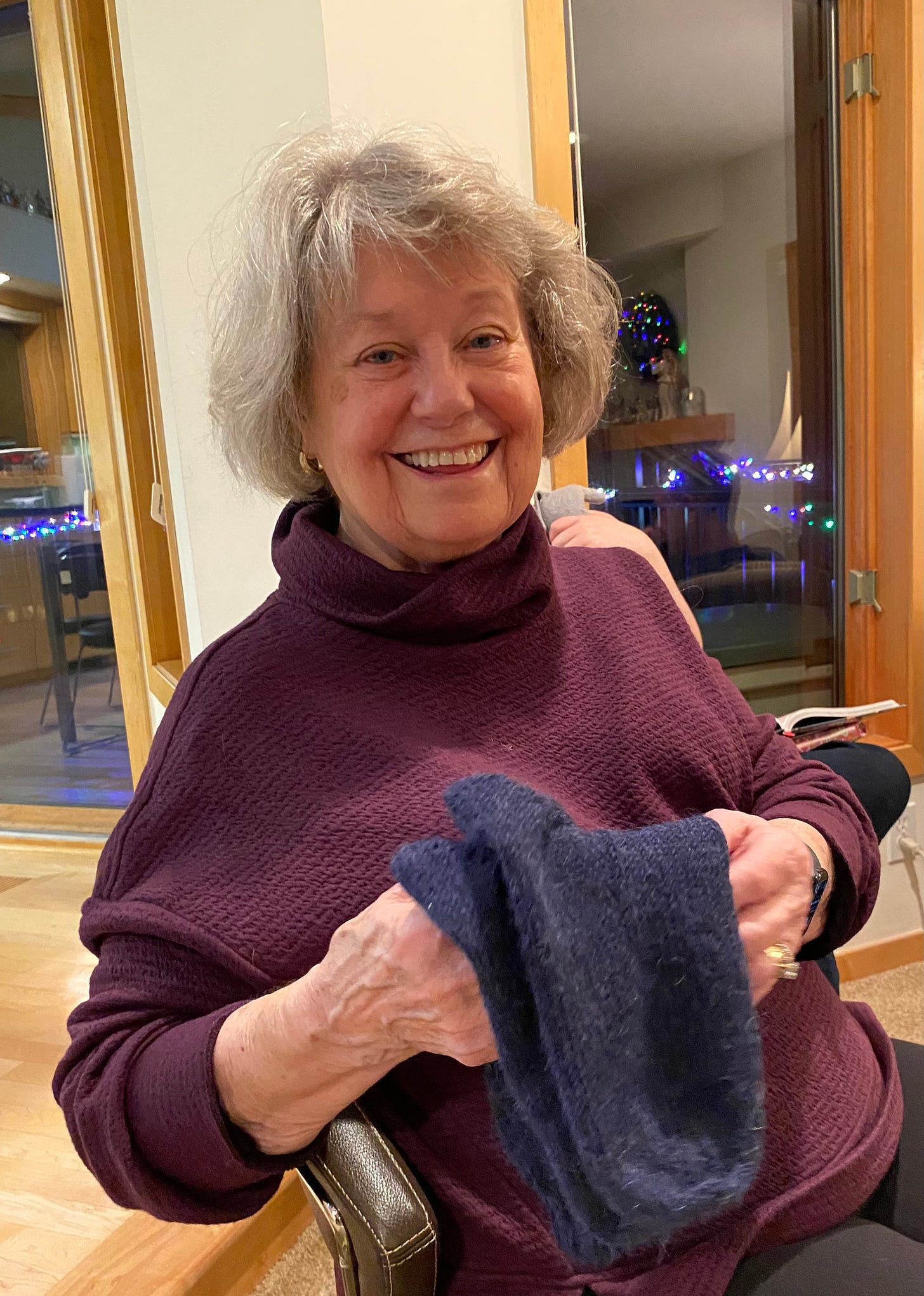You’ve probably heard of the five love languages? Gift-giving, acts of service, spending quality time together, words of affirmation, and touch—all are wonderful ways to show we care. But many of us express our love in ways that aren’t on this list.

(I suspect that our son, Noah, agrees with Dagwood—and Italian grandmothers—that food is the best love language, because he is always planning and cooking up fabulous dinners for his friends and family.)
Besides, while in theory the love languages are equally worthwhile, aren’t some in fact intrinsically better than others?
To paraphrase that famous passage in First Corinthians, there are affirming words, loving touch, and gifts, but . . .
The Greatest of These Is Gifts
My friend Anastasia is absolutely fantastic at choosing the perfect gifts. One day Anastasia and my husband, Matt, got to talking about Russian trains, as one does. (Anastasia is Russian, and Matt lived in Russia as a student.) Matt mentioned that he liked the trains’ tea glasses. Anastasia made a note of the conversation and asked a Moscow friend to pick up a set and bring it along on his next visit. As you can see, Matt is delighted with Anastasia’s thoughtful gift.
Perfect gifts reveal that someone truly gets us, or has remembered a stray remark, or is thinking about us when we’re not there. Some people are just, well, gifted in this way. They have a natural talent for finding the right item or experience to put a huge smile on our faces. I am in awe of them, because I am wretched at gifts:
I once wanted to buy the perfect gift for my college boyfriend. I went to Watertower Place, an enormous, posh mall on the North Side of Chicago. The mall had by my best estimate 50,000 stores, and I went into every single one of them, growing increasingly desperate as the afternoon wore on. And after all that effort, what did I finally choose? A paperweight. I know! I cringe just thinking about it.
Which brings me to a related love language: receiving gifts graciously. If someone gives us an underwhelming gift, we can show our love by accepting it in the spirit in which is was offered. I may be bad at buying gifts, but I am an expert knitter and have made my mom a dozen or so pairs of socks. Yes, socks are kind of a lame gift, but my mom is gratifyingly excited about them every single time.
The Other Best Love Language
As anyone whose friends have helped them move can attest, acts of service are the other best way to show our love. In my experience this is especially true of the men in our lives. They may prefer not to gush about their feelings or to go shopping for gifts, and so they show their love through their actions.
For example, every year for Mother’s Day, Matt washes all the windows in our apartment, which is no small task and beats the heck out of a box of chocolates in my opinion. When I was in college and throughout my twenties, my dad uncomplainingly schlepped my hundreds of books (and the shelves he had built to hold them) through fourteen (!) moves. And when we visit Minnesota, my brother organizes an excursion to a Twins or Timberwolves1 game, and every summer he also plans a lovely day of boating on Lake Minnetonka. He creates playlists of family favorites so we can sing together, checks that the restaurant has vegetarian food for me, and even drops off dramamine ahead of time just in case.
You’re Wearing That?
Matt and I have been watching Arrested Development, a show that, among its many virtues,2 makes it abundantly clear that the worst love language is criticism. The mom, Lucille Bluth, is a master of mean little comments. In the video below, she tells her daughter, who is extremely skinny, that she should lose weight, and she suggests that her granddaughter should cover up her (very cute!) freckles. Watch how Lucille manages to turn a single word, “sleeves,” into a biting insult:
We laugh at Lucille Bluth because she is such a familiar type. We have all had our run-ins with people whose apparent motto is, “If I don’t criticize you and tell you you’re doing it wrong, how will you ever improve?” The linguist Deborah Tannen argues that parents criticize their children out of love: “[They] have spent decades watching out for their children [and] often persist in commenting because they can’t get their adult children to do what is (they believe) obviously right.”
I’ll admit my bias. I grew up in a family where our parents didn’t criticize us, ever. Not our clothes (even when I took to wearing baggy thrift-store finds), not our hair (even when my brother grew it long and bleached it white), not our life choices, not anything. So to me, the criticism that is the norm in so many families doesn’t seem loving but instead feels nitpicky at best and abusive at worst. In an interview, Tannen suggests that we ought to reframe criticism as a loving act. That attitude may help in the short term, but perhaps the onus could also be put on the Lucille Bluths of the world to back off and let their loved ones conduct their lives as they see fit. To paraphrase the moral of one of my favorite novels, Tom Jones,3 it’s not enough to love our family and friends. We must also appear to love them.
If You See Something, Say Something
I am a former English teacher, so of course my preferred love language is words of affirmation—not just compliments but also meaningful conversations. For Mother’s Day this year, I asked my mom a few questions suggested by an article in the New York Times, and we discovered that we have more in common than we had thought. As children both of us had a neighbor who made us feel seen by sharing her love of reading—and books—with us. And it turns out that we are neither of us particularly savvy in the fashion department, alas; my mom’s favorite childhood outfit was red corduroy pants worn with a bright pink batwing sweater, while mine was jeans with a basset hound patch on the back pocket and a T-shirt with a big picture of a basset hound on the front.

We also had the same favorite memory of the two of us together. More than thirty years ago, we went out for lunch and had a rollicking good time, joking and sharing stories. At the end of the meal, our waitress asked us if we were mother and daughter, and when we said we were, she said, “Oh, that is just wonderful. It really is.” When we’re out and about and notice something nice, why not be like the waitress and speak up? Our words of affirmation could create a beautiful memory that will be treasured for decades.
More Happy Love! More Happy, Happy Love!
I think we need to expand our cultural concept of how people show they love us. The conventional list of love languages is all well and good, but it leaves out several additional important ways we care for one another:
Deploying our sense of humor to defuse tension and cheer up our loved ones;
Solving problems and fixing situations, even when our loved one claims she just wants sympathy (she is secretly glad you fixed the computer and didn’t sit there listening to her rant, I promise);
Connecting people, by hosting parties, matchmaking, and networking;4
And best of all, sharing something we love with someone we love.
In the short video below, a dad introduces his little daughter to camping. So heartwarming!
How about you, readers? What is your favorite love language? What love languages would you add to the list? Please share your thoughts in the comments!
The Tidbit
Our daughter, Casey, is brilliant at gift-giving. For Mother’s Day this year, Casey hired the Singing Knights, a campus barbershop quartet, to send me a Mother’s Day singing telegram. What a thoughtful gift for a singer like me!
Please enjoy this stunning version of “Over the Rainbow,” by a barbershop quartet that was founded by a father (the baritone on the right) and son (the tenor on the left). Singing together is a love language too!
GO WOLVES!! Don’t let last night’s drubbing get you down. You can do it! BEAT OKC!!
I have a theory that Arrested Development and Succession are the same show, except one is a comedy and the other is a tragedy.
Both shows feature a sociopathic, right-wing paterfamilias. Both fathers also have brothers who are hippie liberals and assistants who are inexplicably in love with them.
In both, the mother is unimaginably cold and cruel to her kids.
Gob and Connor are both ridiculous, because they are ambitious but don’t recognize how incompetent they are.
Michael and Kendal both think they’re the good guys who will whip their family into shape, and both are sadly mistaken.
Lindsay and Shiv both struggle to be taken seriously, and both are married to men with weird last names (Fünke and Wambsgans) whom their families like to humiliate.
And both of the youngest siblings—Buster and Roman—have wildly inappropriate relationships with much older women.
There is no analogue to Cousin Greg in Arrested Development, but perhaps Maeby can sit on George Michael’s shoulders and they can wear a big trenchcoat to look like they’re Greg’s height.
“It is not enough that your designs, nay that your actions, are intrinsically good, you must take care they shall appear so.” This and many other Tom Jones quotes are here.
I have written before about how my mother-in-law, Louise, is particularly good at this love language. As just one example, many years ago she helped me get my foot in the door for a wonderful teaching job. Her connections rescued my resume from the no doubt giant pile sitting on the department chair’s desk.






I would present family dinner as a form of love language. We have always made a point of having dinner together as a family whenever possible, to the point of not eating until 8pm on the days I worked at the hospital, because that's when I would be home from my shift (ironically, 8pm is normal for dinner in Spain, where I'm living now). Even after the kids went to college--in Pittsburgh, where we live--we continued to have dinner together on Sundays, a sacred event that is now officially called "Fam Dinner." We have even done Fam Dinners while Arthur and I have been overseas this past year. It's about the food, yes, but also the connection and enjoying being together.
Also Deborah Tannen needs to have her head examined if she is trying to pass off criticism as love. Criticism is not love. Not ever. There's no excuse for parents being critical of their kids. Parental concerns can be expressed, but in a loving way, not as criticism--the two things are distinctly and radically different.
The best love language is Klingon.